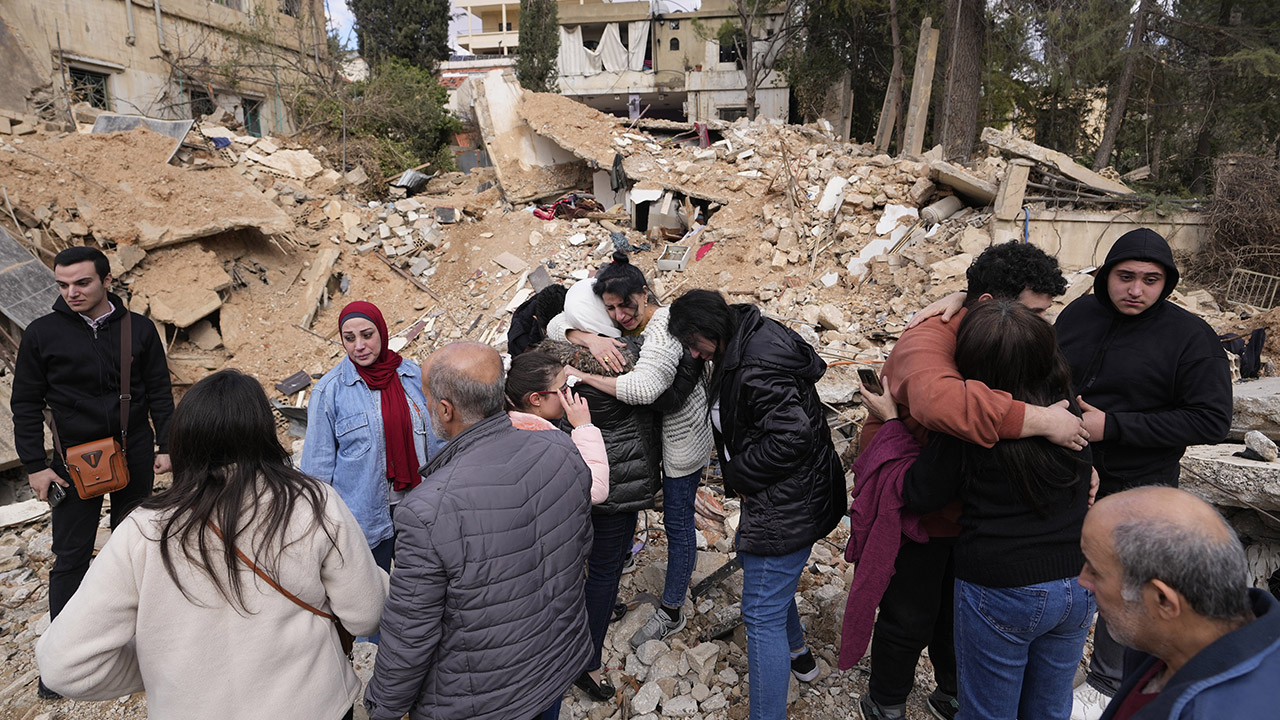Displaced residents hug as they stand in front of the rubble of their destroyed house in Baalbek, eastern Lebanon, Thursday, Nov. 28, 2024. (AP/Hassan Ammar)

- Israeli forces continued to fire on southern Lebanon, killing at least two and injuring 17 as people attempted to return home.
- Sunday's Israeli attacks were the deadliest since the Israel-Hezbollah war truce in November, leaving 24 dead and over 130 injured.
- Despite U.S. efforts for a permanent settlement, Israel extended its occupation in southern Lebanon until Feb. 18, prompting diplomatic concerns.
Share
|
Getting your Trinity Audio player ready...
|
BEIRUT — Israeli forces opened fire toward residents of southern Lebanon for a second consecutive day on Monday as people pressed on with attempts to return to their homes along the border, a day after at least two dozen people were killed and scores injured in Israeli attacks, Lebanese officials said.
Israeli gunfire on Sunday was the deadliest bout of violence in Lebanon since the war between Israel and Hezbollah, the Lebanese militia, ended with a truce in November. In the renewed violence Monday, at least two people were killed and 17 others injured, according to Lebanon’s Health Ministry.
Israeli Military Said It Was ‘Warning Shots’
The Israeli military said in a statement that it had fired “warning shots in order to eliminate threats,” without providing further details about the nature of those threats.
Wire agency photos showed Israeli forces gathered behind makeshift roadblocks, with flattened southern Lebanese villages visible on the rolling hillsides behind them. Some detained men stood crouched alongside a dirt road, blindfolded and with their hands bound as Israeli soldiers stood watch. The images showed Hezbollah flags on full display and crowds of men and women, in addition to the U.N. peacekeepers and Lebanese soldiers attempting to protect them. Television screens, however, have been flooded with the images of the dead.
The Israeli military said Monday that it had redeployed in areas of southern Lebanon, and repeated calls for Lebanese residents to wait for their approval before returning home. The Lebanese military had sent reinforcements to parts of southern Lebanon earlier in the day, preparing to enter some towns and safeguard civilians, Lebanon’s state-run news agency reported.
Israeli forces killed at least 24 people and injured more than 134 others on Sunday, Lebanese officials said, after thousands of Lebanese marched to southern towns and villages. Those areas remain occupied by Israel past a 60-day deadline for its withdrawal under the November ceasefire agreement, which called for Israel and Hezbollah forces to leave southern Lebanon and for the Lebanese army and U.N. peacekeepers to deploy in force there.
The Israeli military said in a statement Sunday that it had fired “warning shots” to disperse what it called “rioters.” Last week, Israel had indicated that it would remain in southern Lebanon despite the deadline, amid doubts about the Lebanese army’s ability to stymie Hezbollah’s resurgence.
Negotiators Hoped for a More Permanent Settlement
Negotiators had hoped that the U.S.-brokered ceasefire by now would have given way for a more permanent settlement. But as the 60-day deadline elapsed Sunday, the White House issued a statement stating that the initial agreement would be extended until Feb. 18. The Lebanese prime minister’s office confirmed the extension, which they said followed discussions with U.S. officials. The flurry of diplomatic activity appeared designed to buy time and stave off further bouts of violence.
The bloodshed Sunday sparked urgent calls for restraint by the U.N. amid growing fears of a sustained Israeli occupation and renewed hostilities between Israel and Hezbollah. Hezbollah, however, stopped short of its characteristic calls for revenge in the wake of the killings.
Battered by the deadliest war with Israel in decades, experts say the group has little impetus to reignite a conflict that would only weaken the group further as it attempts to recover. Instead, Hezbollah called on the international community in a statement to “assume its responsibilities” and pressure Israel to “withdraw completely from our lands.”
—
This article originally appeared in The New York Times.
By Euan Ward
c. 2025 The New York Times Company




















